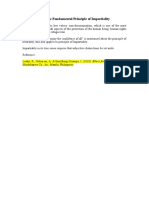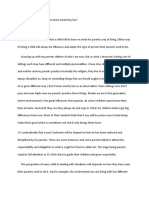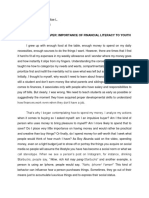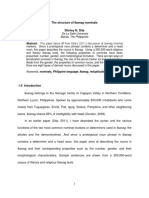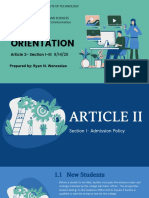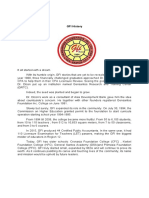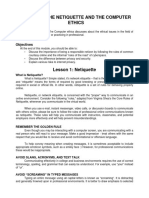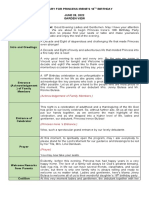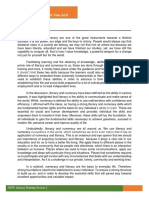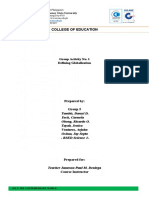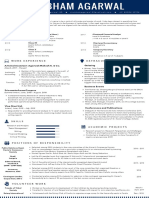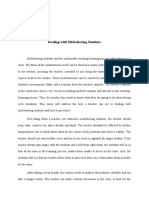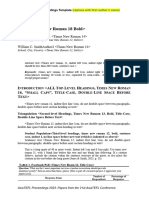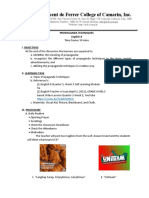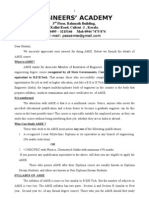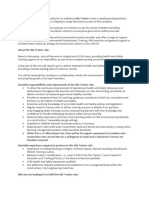Baloca, Vincent Jay - Bsedeng - NSTP Lts A - Reflection About Gender Sensitivity
Baloca, Vincent Jay - Bsedeng - NSTP Lts A - Reflection About Gender Sensitivity
Uploaded by
Vincent Jay BalocaCopyright:
Available Formats
Baloca, Vincent Jay - Bsedeng - NSTP Lts A - Reflection About Gender Sensitivity
Baloca, Vincent Jay - Bsedeng - NSTP Lts A - Reflection About Gender Sensitivity
Uploaded by
Vincent Jay BalocaOriginal Title
Copyright
Available Formats
Share this document
Did you find this document useful?
Is this content inappropriate?
Copyright:
Available Formats
Baloca, Vincent Jay - Bsedeng - NSTP Lts A - Reflection About Gender Sensitivity
Baloca, Vincent Jay - Bsedeng - NSTP Lts A - Reflection About Gender Sensitivity
Uploaded by
Vincent Jay BalocaCopyright:
Available Formats
BALOCA, VINCENT JAY, C.
BSEd 1 – ENGLISH
Course Instructor: Ana Gretchen D. Tobe, Ed.D.
REFLECTION
One of the webinar's goals was to raise gender awareness and gender sensitivity.
The webinar emphasizes the need of eradicating erroneous gender stereotypes and
misconceptions.
We are all aware of the pervasiveness of gender stereotypes but our webinar does
not rehash the same points. Instead, the speaker turns the attention to a related aspect
— about gender sensitivity. Simply explained, being sensitive means being aware of other
people's sentiments. Gender sensitivity in this context refers to being aware of the feelings
of the opposite gender. This is significant because men and women, including the
member of LGBT community think differently and, as a result, have distinct views.
Throughout the webinar, I realized that the first and most crucial component of
gender sensitivity is to be open to any colleague of the opposite gender's view and
sentiments. This could be as basic as learning enough about their personal concerns to
have a more nuanced knowledge of gender-specific characteristics like rude comments
or jokes. Although there is a growing awareness of this issue, and some organizations
have begun to establish the boundaries of acceptable behavior, the onus remains on the
individual. Men, women and other genders are increasingly working together in
management roles, and teams will not be effective unless there is mutual respect.
Unfortunately, the majority of people are not taught gender awareness or other
inclusive behaviors. With this, a gender-linked characterization problem emerges,
dictating or influencing what a woman or man should do and can be, and so dictating or
influencing men's and women's development and viewpoints in society. Our educational
system is doing everything they can to help us in any way they can, and they continue to
push for Gender and Development to be mainstreamed in policies, plans, programs, and
structures. I firmly believe that Gender Mainstreaming or Gender and Development (GAD)
mainstreaming is the major strategy for ensuring that the schools and other entities
pursues gender equality in all aspects of the development process to achieve the vision
of a gender-responsive society where women and men equally contribute to and benefit
from development. However, due to the fact that many schools, including colleges, are
not co-educational, students are obliged to socialize with people of their own gender and
focus on what their gender must be and other genders should not, which often times lead
to gender stereotypes and discrimination.
In essence, the webinar made me think about a variety of things related to gender
issues and realized that gender sensitivity is all about overcoming erroneous beliefs and
perceptions, as well as learning how to interact with people of different genders. It is
preferable to learn and practice this as soon as possible.
NSTP: Literacy Training Services 2
You might also like
- Ccnav7.02: Switching, Routing, and Wireless Essentials (Srwe) Release NotesDocument4 pagesCcnav7.02: Switching, Routing, and Wireless Essentials (Srwe) Release NotesWalid UmarNo ratings yet
- Gender and Other Cross Cutting Issues Mental HealthDocument6 pagesGender and Other Cross Cutting Issues Mental HealthJamira Inoc SoboNo ratings yet
- Lesson 1 - The Basics of CommunicationDocument10 pagesLesson 1 - The Basics of CommunicationPamela AmitNo ratings yet
- Historical Background of SMCC (CTE)Document1 pageHistorical Background of SMCC (CTE)Gemma Mae B. Abellanosa100% (2)
- JaphetDocument1 pageJaphetSancho AcbangNo ratings yet
- Rumi Sethi's Guide To Working From HomeDocument55 pagesRumi Sethi's Guide To Working From Homenpis4ol100% (1)
- The Impact of Globalization On How People CommunicateDocument1 pageThe Impact of Globalization On How People CommunicateJustine joy EstoqueNo ratings yet
- Consequence of The Fundamental Principle of ImpartDocument2 pagesConsequence of The Fundamental Principle of ImpartMark Hizon BellosilloNo ratings yet
- Stereotypes and Biases: ActivityDocument4 pagesStereotypes and Biases: ActivityRoseinne PeralesNo ratings yet
- Ethics Lesson 4Document9 pagesEthics Lesson 4Vanessa Ambroce100% (1)
- Reflection paper-WPS OfficeDocument2 pagesReflection paper-WPS OfficeCalystaNo ratings yet
- Lesson 1 - UnitDocument7 pagesLesson 1 - UnitLabra SunshineNo ratings yet
- SOPDocument6 pagesSOPRichard PatunganNo ratings yet
- Reflection On The Nature of LanguageDocument1 pageReflection On The Nature of LanguageBagfinity Styles0% (1)
- Reflection Paper About Locomotor and Non-Locomotor MovementsDocument1 pageReflection Paper About Locomotor and Non-Locomotor MovementsanaryNo ratings yet
- Reflection Paper: Importance of Financial Literacy To YouthDocument2 pagesReflection Paper: Importance of Financial Literacy To YouthCRISTEL MAE BARRANCONo ratings yet
- Rizal - Mabuting PilipinoDocument1 pageRizal - Mabuting PilipinoCHARLES RONALD GENATO100% (1)
- ACKNOWLEDGEMENT NSTPDocument1 pageACKNOWLEDGEMENT NSTPbunso padillaNo ratings yet
- Avoid The Pressure To Have SexDocument1 pageAvoid The Pressure To Have SexMARICEL PRONGONo ratings yet
- What Are Your Observations or Generalizations On How Text/ and or Images Are Presented?Document2 pagesWhat Are Your Observations or Generalizations On How Text/ and or Images Are Presented?Darlene PanisaNo ratings yet
- My AutobiographyDocument3 pagesMy Autobiographycristine joyceNo ratings yet
- GE 10 - Module 1Document12 pagesGE 10 - Module 1Jekyll Pal-ingNo ratings yet
- 9200 San Miguel Village, Iligan City, Lanao Del NorteDocument4 pages9200 San Miguel Village, Iligan City, Lanao Del NorteAimee Bonachita PaquinganNo ratings yet
- Position Paper2Document2 pagesPosition Paper2Eizah PiaNo ratings yet
- Ailene F. Quinto BSMA-lll 1.whether or Not Moral Training Is The Primary Aim of EducationDocument3 pagesAilene F. Quinto BSMA-lll 1.whether or Not Moral Training Is The Primary Aim of Educationjennie kimNo ratings yet
- Reflection Paper (August)Document2 pagesReflection Paper (August)Gao DencioNo ratings yet
- Case AnalysesDocument2 pagesCase AnalysesApril CaringalNo ratings yet
- The Structure of Ibanag NominalsDocument27 pagesThe Structure of Ibanag Nominalsaimee_jcNo ratings yet
- 45stuptr2 Chapter+1Document46 pages45stuptr2 Chapter+1Jerel John CalanaoNo ratings yet
- community-immersion-waiver-PAGARAN, FERDINANDDocument1 pagecommunity-immersion-waiver-PAGARAN, FERDINANDFerdinand PagaranNo ratings yet
- Assignment 4.1Document6 pagesAssignment 4.1May Anne EnnaNo ratings yet
- Rules of Good Manners and Right ConductDocument2 pagesRules of Good Manners and Right ConductKristine Anne San JuanNo ratings yet
- Eng - 105 Purposive Communication: by Sherry TurkleDocument7 pagesEng - 105 Purposive Communication: by Sherry TurkleMarisol Plaza NadonzaNo ratings yet
- Respect For Elders (Paggalang Sa Nakatatanda)Document6 pagesRespect For Elders (Paggalang Sa Nakatatanda)Labo MacamosNo ratings yet
- How Globalization Is My Home?: InstructionDocument5 pagesHow Globalization Is My Home?: InstructionKim Trayvis AbaldeNo ratings yet
- Basic OR Article 2 - Section 1 To 3Document24 pagesBasic OR Article 2 - Section 1 To 3Jean MojadoNo ratings yet
- Reaction Paper On MediaDocument2 pagesReaction Paper On MediaChelsie Barrera100% (2)
- Baby For Sale Atom ArroyoDocument2 pagesBaby For Sale Atom ArroyoGORGEOUSLY INSANE100% (1)
- Fun Run ExperienceDocument1 pageFun Run Experiencejoan arreolaNo ratings yet
- PPT. LCCians Lesson 1 and 2Document22 pagesPPT. LCCians Lesson 1 and 2tricia onaNo ratings yet
- Social Dance & Characteristics: Introduction ToDocument8 pagesSocial Dance & Characteristics: Introduction ToJohn Rosswald Del RosarioNo ratings yet
- Reaction SpeechesDocument2 pagesReaction SpeechesDynie Anne PoliquitNo ratings yet
- Cooperative Management ReflectionDocument2 pagesCooperative Management ReflectionFaker Mejia100% (1)
- Demetillar Pages 53-63 AnswerDocument1 pageDemetillar Pages 53-63 AnswerChristian J SebellinoNo ratings yet
- GFI HistoryDocument6 pagesGFI HistoryshekNo ratings yet
- NORSU Hymn, Mission, VisionDocument3 pagesNORSU Hymn, Mission, VisionReign Isabel ValeraNo ratings yet
- Developmental Theories Reflection #1: Freud'S Psychoanalytic TheoryDocument13 pagesDevelopmental Theories Reflection #1: Freud'S Psychoanalytic Theoryエルミタ ジョイ ファティマ100% (1)
- Expectations To NSTPDocument1 pageExpectations To NSTPXyrille GregorioNo ratings yet
- Reflect On The Importance of Influencers in An IndividualDocument1 pageReflect On The Importance of Influencers in An IndividualIlyssa Divine Salig BagoNo ratings yet
- Activity 1.1Document2 pagesActivity 1.1Javen Lei Miranda MarquezNo ratings yet
- Daiz, Kate (Uts Activity 4)Document1 pageDaiz, Kate (Uts Activity 4)Kate DaizNo ratings yet
- PE 2 Module 2021Document87 pagesPE 2 Module 2021Hoyo VerseNo ratings yet
- How Would Be A World Without Values?Document4 pagesHow Would Be A World Without Values?Adrián Meneses100% (1)
- Respect For Human LIfeDocument2 pagesRespect For Human LIfeCrystal HolgadoNo ratings yet
- Module 4: The Netiquette and The Computer EthicsDocument5 pagesModule 4: The Netiquette and The Computer EthicsZaira EdiomaNo ratings yet
- Reading and Writing Program (RAWP) For Sama-Badjaos Out-of-School ChildrenDocument4 pagesReading and Writing Program (RAWP) For Sama-Badjaos Out-of-School ChildrenRodilyn GuindulmanNo ratings yet
- Esclamada - ABTH 1 - Assignment#5 - UTSDocument3 pagesEsclamada - ABTH 1 - Assignment#5 - UTSHazel Jane EsclamadaNo ratings yet
- Orca Share Media1572918897437Document9 pagesOrca Share Media1572918897437Ge Ann BesoniaNo ratings yet
- Pagkamaka-Diyos: Faith Alone Bro. Andrew Maria, MMHCDocument8 pagesPagkamaka-Diyos: Faith Alone Bro. Andrew Maria, MMHCJoyceVersalesNo ratings yet
- Contemporary Philippines Arts From The RegionDocument6 pagesContemporary Philippines Arts From The RegionyouismyfavcolourNo ratings yet
- GED 11 Gender and Society Reflective Essay Laseras VDocument7 pagesGED 11 Gender and Society Reflective Essay Laseras VVhea LaserasNo ratings yet
- ProposalDocument4 pagesProposaljustinerenio7No ratings yet
- SCRAPBOOKDocument32 pagesSCRAPBOOKVincent Jay BalocaNo ratings yet
- MEANING OF LIFE - Lim, Brylle NinoDocument2 pagesMEANING OF LIFE - Lim, Brylle NinoVincent Jay BalocaNo ratings yet
- Princess Irene Debut FormularyDocument5 pagesPrincess Irene Debut FormularyVincent Jay BalocaNo ratings yet
- Best YellDocument1 pageBest YellVincent Jay BalocaNo ratings yet
- Learning Journal TemplateDocument1 pageLearning Journal TemplateVincent Jay BalocaNo ratings yet
- Template 2Document25 pagesTemplate 2Vincent Jay BalocaNo ratings yet
- Module 5 Lesson 4Document3 pagesModule 5 Lesson 4Vincent Jay BalocaNo ratings yet
- NSTP LTS A - Reflection About Creative LearningDocument2 pagesNSTP LTS A - Reflection About Creative LearningVincent Jay BalocaNo ratings yet
- BALOCA, Vincent Jay - BSEdEng - NSTP LTS A - REACTION On Literacy and NumeracyDocument1 pageBALOCA, Vincent Jay - BSEdEng - NSTP LTS A - REACTION On Literacy and NumeracyVincent Jay BalocaNo ratings yet
- Baloca, Vincent Jay - Bsedeng - NSTP Lts A - Reflection On Health Awareness WebinarDocument2 pagesBaloca, Vincent Jay - Bsedeng - NSTP Lts A - Reflection On Health Awareness WebinarVincent Jay BalocaNo ratings yet
- NSTP LTS A - Reflection About Technology LiteracyDocument2 pagesNSTP LTS A - Reflection About Technology LiteracyVincent Jay Baloca100% (1)
- Sample of Group OutputDocument8 pagesSample of Group OutputVincent Jay BalocaNo ratings yet
- Real Feasibility Fasmo Skin Protectant - BalocaDocument6 pagesReal Feasibility Fasmo Skin Protectant - BalocaVincent Jay BalocaNo ratings yet
- INDIVIDUAL ACTIVITY MODULE 5 SOULMAKING, APPROPRIATION, ANG IMPROVISATION (BALOCA) BSEd 1-ENGLISHDocument2 pagesINDIVIDUAL ACTIVITY MODULE 5 SOULMAKING, APPROPRIATION, ANG IMPROVISATION (BALOCA) BSEd 1-ENGLISHVincent Jay BalocaNo ratings yet
- Rahul Ingle - Image ProcessingDocument4 pagesRahul Ingle - Image ProcessingTMSNo ratings yet
- 0610 s11 Ms 61Document7 pages0610 s11 Ms 61arenestarNo ratings yet
- Shubham AgarwalDocument1 pageShubham AgarwalShubham AgarwalNo ratings yet
- B2-Unit 1Document8 pagesB2-Unit 1pinguinaNo ratings yet
- English 8.lesson 1 Deep Learning vs. Surface LearningDocument11 pagesEnglish 8.lesson 1 Deep Learning vs. Surface LearningLance MamanoNo ratings yet
- 2am English All Sequences PlansDocument99 pages2am English All Sequences PlansCĥī Râž100% (1)
- Lesson Exemplar Modular Distance Modality (Learners-Led Modality) I. ObjectivesDocument3 pagesLesson Exemplar Modular Distance Modality (Learners-Led Modality) I. ObjectivesLIWAYWAY DE LUNANo ratings yet
- Classroom Management EssayDocument5 pagesClassroom Management EssayMaulidya NamiraNo ratings yet
- Emarking Notes For SSC IIDocument61 pagesEmarking Notes For SSC IISobia ZeeshanNo ratings yet
- TemplateDocument3 pagesTemplateImas IstianiNo ratings yet
- Curriculum Vitae: Name Address: Telephone: 07972 081127 EmailDocument2 pagesCurriculum Vitae: Name Address: Telephone: 07972 081127 Emailapi-374250947No ratings yet
- PROPAGANDADocument3 pagesPROPAGANDAJudette GuerraNo ratings yet
- Learning by Ear Jobs Education Radio Drama 04 ScriptDocument9 pagesLearning by Ear Jobs Education Radio Drama 04 ScriptShanice ThompsonNo ratings yet
- امتحان شفهي نصف السنة 2020-2021Document2 pagesامتحان شفهي نصف السنة 2020-2021Yacine KhalidNo ratings yet
- Transformasi Teori Kognitivisme Dalam Belajar Dan PembelajaranDocument19 pagesTransformasi Teori Kognitivisme Dalam Belajar Dan PembelajaranMohensia AlabatriNo ratings yet
- Student's Written Works and Performance Tasks - Monitoring and Self-Evaluation FormDocument7 pagesStudent's Written Works and Performance Tasks - Monitoring and Self-Evaluation Formapi-511197414No ratings yet
- AmieDocument17 pagesAmielazeez.co.in86% (7)
- Infrastructures: Smart LibrariesDocument11 pagesInfrastructures: Smart LibrariesNguyen Phuong Nam (K14 HL)No ratings yet
- Case StudyDocument5 pagesCase StudyJhon carlo CastroNo ratings yet
- Heslb Loan Application GuidelinesDocument8 pagesHeslb Loan Application GuidelinesCleverence KombeNo ratings yet
- Sri Ramakrishna Kathamrita - Volume IVDocument357 pagesSri Ramakrishna Kathamrita - Volume IVapi-19985927100% (2)
- Unit 1: Switch On VideoscriptsDocument4 pagesUnit 1: Switch On VideoscriptsVitaNo ratings yet
- PAPERrevised AutoRecovered AutoRecovered 2Document57 pagesPAPERrevised AutoRecovered AutoRecovered 2Joanna PaduaNo ratings yet
- DLL - Mathematics 4 - Q1 - W8Document4 pagesDLL - Mathematics 4 - Q1 - W8Nelson Dableo100% (1)
- OseiDocument4 pagesOseioseisilasyawNo ratings yet
- Management Theories and Legal IssuesDocument16 pagesManagement Theories and Legal IssuesCharlie MaineNo ratings yet
- First-Year Students AI-competence As A Predictor For Intended and de Facto Use of AI-tools For Supporting Learning Processes in Higher EducationDocument13 pagesFirst-Year Students AI-competence As A Predictor For Intended and de Facto Use of AI-tools For Supporting Learning Processes in Higher EducationYASSER HIPOLITO YARIN ACHACHAGUANo ratings yet
- HSE TrainerDocument2 pagesHSE Trainersquidge4646No ratings yet







